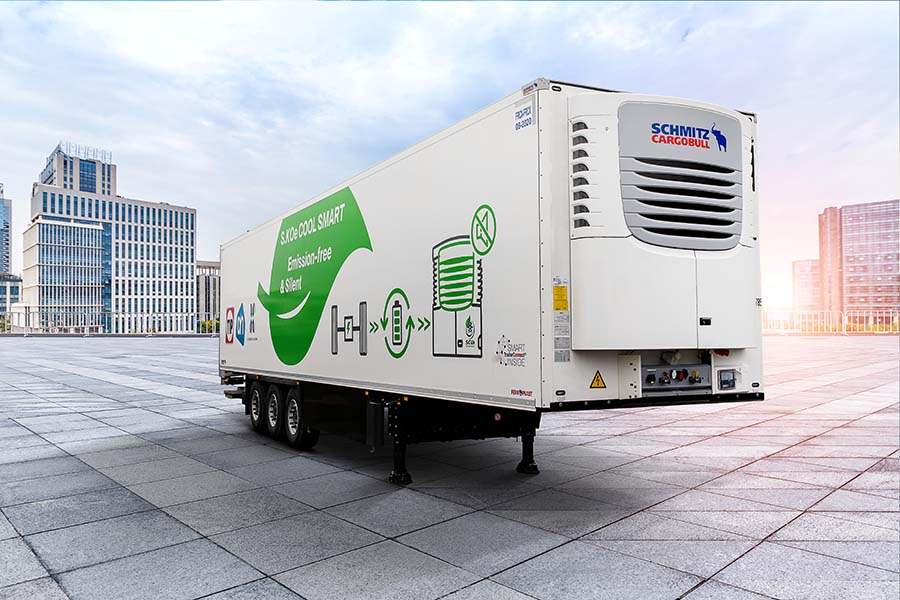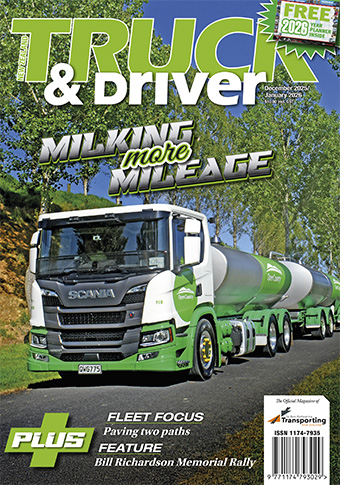Aeolus Truck & Driver News


More funding for electric trials
Aeolus Truck & Driver News
Several electric loaders, a 90-tonne electric offroad dump truck and a fully electric refrigerated semi-trailer are among 19 new transport projects receiving support in the latest rounds of Low Emission Transport Fund announcements.
The 19 projects are from two Low Emission Transport Fund (LETF) rounds covering the maritime sector, as well as off-road equipment and new technology. The Energy Efficiency and Conservation Authority (EECA) says a total of $6.4 million in Government funding will leverage $18.2 million in applicant investment in new technologies.
“Whilst electric cars are taking off, a significant amount of fossil fuels are used in marine and off-road settings and are seen as areas that are harder to decarbonise,” says Energy and Resources Minister, Hon Dr Megan Woods.
The LETF funding will also support the establishment of road construction crews using zero-emissions equipment and the development of an electric hydrofoil ferry.
...Several electric loaders, a 90-tonne electric offroad dump truck and a fully electric refrigerated semi-trailer are among 19 new transport projects receiving support in the latest rounds of Low Emission Transport Fund announcements.
The 19 projects are from two Low Emission Transport Fund (LETF) rounds covering the maritime sector, as well as off-road equipment and new technology. The Energy Efficiency and Conservation Authority (EECA) says a total of $6.4 million in Government funding will leverage $18.2 million in applicant investment in new technologies.
“Whilst electric cars are taking off, a significant amount of fossil fuels are used in marine and off-road settings and are seen as areas that are harder to decarbonise,” says Energy and Resources Minister, Hon Dr Megan Woods.
The LETF funding will also support the establishment of road construction crews using zero-emissions equipment and the development of an electric hydrofoil ferry.
“These projects will prove the potential of electrification and other low-emissions technology. This kind of backing de-risks projects like these so there is more and faster uptake of similar technology,” Woods says.
“Each year, the maritime and off-road sectors together use an estimated 1.6 billion litres of petrol and diesel accounting for around 13% of our total energy-related greenhouse gas emissions.
“Reducing emissions in these areas is vital, not just to meet our emissions targets and tackle climate change, but we’ll also reap significant co-benefits, especially in the marine sector.”
Of the most interest to the road transport sector is a $200,000 grant to Fruehauf NZ to demonstrate a 13.5m Schmitz Cargobull refrigerated trailer.
The three-axle Schmitz Cargobull S.KOe COOL trailer is equipped with a fully electric cooling unit with integrated power electronics, a battery system and an e-axle generator.
The e-axle generator axle powers the refrigeration unit in place of a diesel generator, which makes the trailer zero-emissions.. The e-axle also recuperates energy from deceleration with any surplus stored in a 20kWh battery pack mounted to the landing gear.
The energy recuperated during braking extends the cooling unit’s operating time or reduces the recharging times of the battery via the power grid. This also reduces waiting times at distribution centres.
An intelligent battery charging management function ensures that the battery charge level remains as high as possible to provide greater reliability when the vehicle is stationary, for example in traffic jams.
The system is fully integrated into the Schmitz Cargobull telematics system, enabling the respective system status such as the battery charge level, remaining range, and remaining charging time, to be monitored via the telematics portal.
Schmitz Cargobull has developed the S.KOe COOL technology in Europe over the past few years and has introduced the trailers with several fleets.
“We expect the trailer will arrive from Germany in late Q1 or early Q2 next year. It can work with any tractor unit, you just hook it up and go - it’s self-contained,” says Mark Madelin, General Manager Commercial at Fruehauf NZ.
“Our intention is to put it to work in everyday transport situations - no different to any refrigerated trailer - so we can prove the technology.
“There are currently over 15 units operating in Europe. Once we have proof of concept our long-term goal is for Fruehauf NZ to import the e-axle generator and battery system to build them here.”
The S.KOe COOL technology is being developed in response to many European cities planning new legislation for emission-free inner-city distribution transport.
Electrification also makes the trailer extremely quiet, enabling early morning and late evening deliveries in urban areas.
In other LETF projects announced in the latest round of funding, Reliance Transport will continue its electrification steps which began last year with the introduction of two 29-tonne (GCM) Scania eTrucks for container movements.
Reliance has a further $500,000 of support to purchase and operate an electric reach stacker, a 16-tonne fork hoist and also install a microgrid and 350kW fast charger.
TDX has meanwhile secured $498,625 of funding toward a demonstration project involving three electric wheel loaders, including one pre-production Volvo 20-tonne machine.
Another company to widen its electrification efforts is Firth Industries which has $137,000 funding towards a trial of an electric wheel loader to be used in concrete production.
Fletcher Concrete and Infrastructure has secured $499,500 for its Winstone Aggregates division to trial a 90-tonne electric dump truck at the Belmont Quarry in Lower Hutt. The project will pilot the application of the largest heavy electric vehicles in New Zealand.
Leach & Co Ltd has a $104,000 grant to replace a diesel-powered wheel loader with an electric XCMG XC968EV 19,850kg wheel loader at the Southern Landfill operations near Wellington.
Brian Perry Civil has developed a project to create a zero-emission road construction crew with an electric excavator, tipper and wheel loader supported by 60Kw and 90kW chargers. That project has secured $432,855 in LETF joint funding.
And Issac Construction in Christchurch is the recipient of $285,500 to create an electrified road construction crew.
In the tourism sector Outback New Zealand (Nomad Safaris/Info & Track/Snow) has secured $217,125 to replace a diesel coach with a new electric 25-seat coach for visitor transport to the Routeburn Trailhead in summer and the Coronet Peak and Remarkables ski fields during winter.
Other grants enable projects include new grid and charging initiatives along with innovations in the marine sector.
CentrePort is working with StraitNZ to install shore-based power supply to ferries moored at Wellington’s King’s Wharf.
A $500,000 grant will establish a shore-based power supply, allowing StraitNZ ferries to turn their diesel engines and generators off while berthed in Wellington and still maintain power to their onboard systems. The benefits of this initiative include reduced carbon emissions and better air quality.
CentrePort provides the wharves and infrastructure that Cook Strait ferries use in Wellington. Equipment enabling shore power for StraitNZ ferries will be installed at King’s Wharf and in the nearby electrical network to support the additional load on the grid.
Providing shore-based power for StraitNZ ferries is part of CentrePort’s wider programme to reduce emissions in the New Zealand supply chain and be a carbon-zero port by 2040.
Another $500,000 of funding to Seachange New Zealand and Fullers 360 will support demonstration of a zero-emission electric hydro foiling passenger vessel on a Hauraki Gulf service and there are other marine projects including electric tender craft and marina security vessels.
The Low Emission Transport Fund, administered by EECA, supports the demonstration and adoption of low-emission transport technology, innovation and infrastructure to accelerate the decarbonisation of the New Zealand transport sector.



 + EQUIPMENT GUIDE - FREE
+ EQUIPMENT GUIDE - FREE
